With the increasing popularity of the keto diet, supplement companies are flooding the shelves with keto supplements. The most convincing supplement of them all — from a marketing perspective — is exogenous ketones.
These keto supplements promise that you can have your cake and eat it too, literally and metaphorically. How? By giving you the ability to experience the benefits of the keto diet without having to limit your carb intake.
After looking at typical keto weight loss results and learning a bit about ketones and ketosis, the most common marketing claims for exogenous ketones seem reasonable enough:
- Ignite fat loss
- Increase exercise performance
- Become a fat burning machine
- Eliminate cravings and gain control over your appetite
- Decrease stress and fatigue
- Increase your energy levels and mental clarity
If the keto diet unlocks these benefits and burning ketones is the key, then shouldn’t we get similar results from ingesting ketone supplements and going directly to ketosis?
To answer this question, we have to look at keto, ketosis, and the best exogenous ketone supplementation from multiple perspectives:
- An Overview of Nutritional Ketosis
- What Are Exogenous Ketone Supplements? Ketone Salts vs. Ketone Esters
- Exogenous Ketone Supplements Vs. Keto Diet Ketosis: A Physiological Perspective
- Keto Myth Busting: Exogenous Ketone Marketing Claims
- Diving into the Ketone Salt and Ketone Ester Research: The Potential Benefits
- Ketone Salts and Esters: The Downsides
- The Pros and Cons of Exogenous Ketone Supplements
- Are They Worth it for You?
- Boosting Ketone Production with Supplements: MCTs
- MCT Oil vs. Exogenous Ketones: Which One is the Better Ketone-boosting Supplement?
- What is the Best Ketone-boosting Supplement? With Recommendations from Dr. Dom D’Agostino
- What About Raspberry Ketones?
- Key Takeaways: Everything You Need to Know About Ketone Supplements
After we develop an understanding of ketosis and ketone supplements from each angle, you will be able to determine if exogenous ketones are worth your money and which ketone supplement may be best for you.
Ketones and Ketosis: A Quick Overview of a Lifesaving Process
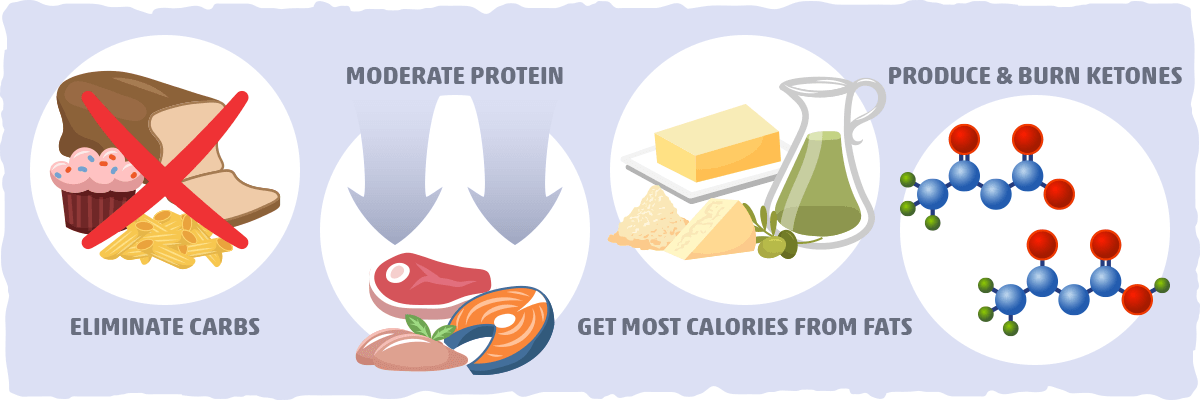
Within the context of normal human physiology, ketones are an alternative fuel source your liver produces when there isn’t enough sugar to support the energy needs of your cells (especially your brain cells).
Ketone production was once a lifesaving feat that helped our ancestors survive famines, but now we intentionally use ketones for their unique health benefits (e.g., increased mental clarity, decreased fatigue, reduced appetite, and improved sense of wellbeing and vitality).
The only healthy way to stimulate this ketone-producing process and experience these benefits consistently is by following a keto diet — i.e., limiting your carb consumption, eating moderate amounts of protein, and getting most of your calories from fat.
As soon as we consume enough carbs or overeat protein, we flood our body with energy sources that promptly shut down ketogenesis — the metabolic process behind ketone production — until our sugar needs aren’t being met.
In contrast, when we restrict carbs enough to stimulate ketogenesis continuously, our blood ketone levels begin to rise until we enter a state referred to as nutritional ketosis. Once blood ketone levels reach 0.5 mmol/L or more, you are technically in ketosis and will start experiencing many of the unique benefits of keto dieting. As ketone levels rise, your ability to use them will increase along with their positive effects.
Thousands of people have followed this dietary approach and achieved incredible health and weight loss results. However, the newfound availability of exogenous ketone supplements raises a controversial question: What if you could skip the lifestyle changes required to follow a keto diet and get similar results by simply ingesting exogenous ketones every day?
This question exemplifies exactly where false hope and misleading claims collide to fuel the booming keto supplement industry.
A (Costly) Shortcut to Ketosis: What Are Exogenous Ketone Supplements?
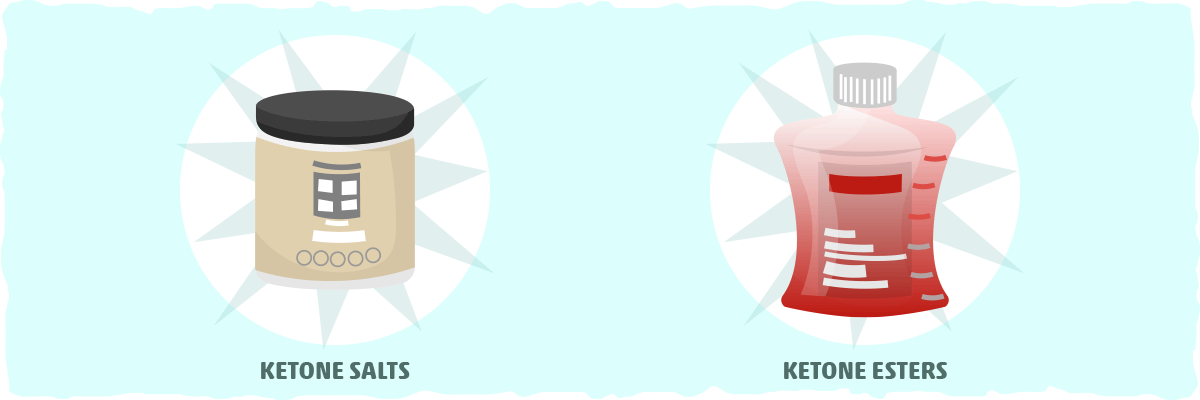
At first glance, the logic behind taking exogenous ketones makes sense. Ketosis seems like the secret behind keto success, so shouldn’t we get the same benefits from consuming ketones?
Born out of this simple question was a plethora of supplements called exogenous ketones, which translates to ketones that originate from (“-genous”) outside of the body (“exo-“).
In other words, exogenous ketone bodies are made in a laboratory, packaged as a supplement, and ingested by the consumer as a way to increase ketone levels without having to wait for the liver to produce ketones endogenously (inside of your body).
There are three primary forms of exogenous ketone supplements:
- Ketone salt powders — These are ketone bodies bound to a mineral, typically sodium, potassium, calcium, or magnesium. Ketone salts are commonly sold as a flavored powder that can be mixed with liquid to create a ketone drink.
- Keto diet pills — Most keto pills are simply ketone salt powder packed into capsules.
- Ketone esters — These are ketones that are bonded to another compound called an ester and packaged in liquid form. Ketone esters are used primarily in research due to their reliability and efficiency, but they are much more expensive and bitter-tasting than ketone salts.
Though each type of exogenous ketone product has been shown to increase blood ketone levels (without having to follow a ketogenic diet), there are several nuances to be aware of before purchasing any of these options.
Ketone Salt Powders
Ketone salts are the most accessible exogenous ketone bodies, with a plethora of products on the market in both pill and powder form. Beta-hydroxybutyrate (BHB) powders will give you the most bang for your buck.
Below we’ve included examples of high-quality ketone salt powders with BHB ketone bodies that you’re likely to come across:
- Pruvit’s KETO OS NAT — BHB ketone salts that are heavily marketed as the best exogenous ketones. However, there is absolutely no research to back the claims behind their superiority. You can learn more about Pruvit’s ketone products in our comprehensive Keto OS review article.
- Pruvit’s KETO OS PRO — A combination of BHB ketone bodies, protein powder, and MCT oil powder. Though each ingredient can help you reach your keto goals, the dosage is too low to justify the cost.
- Key Keto Exogenous Ketone Supplement — A flavored ketone salt product that is one of the few keto supplements with an NSF Certified for Sport® certification.
- Perfect Keto Base Exogenous Ketones — Regarded as one of the best-tasting ketone salts on the market, with similar ingredients as Key Keto.
Keto Pills: The Cheapest Shortcut to Keto Diet Results?
Whether they are called “keto diet pills,” “keto pills,” or “keto weight loss pills,” these keto supplements are typically just low-dose exogenous ketone salts. Unfortunately, they are marketed to keto dieters as if they are the key to fat burning and losing weight rapidly.
Though it is true that they increase blood ketone levels, keto pills will not translate to any significant increases in ketosis, fat loss, or fat burning. (In fact, as we will discover later, exogenous ketones temporarily decrease fat burning.)
Some popular BHB keto pills that fall into this category (and are typically not worth the cost) include:
- Ketopower Boost
- KetoCharge
- OneShot Keto
- Strong Keto Pills
- Vitamin Bounty Get Into Keto
- Approved Science® Keto
- Keto BHB
You’ll notice that these are the cheapest keto products that contain BHB ketone bodies. However, this relatively low cost only represents the fact that they don’t contain as much BHB per serving as ketone salt powders.
Given the low doses of ketones that can fit into each keto pill, these are the worst exogenous ketones for raising ketone levels significantly.
Ketone Esters: The Best Exogenous Ketones, but Are They Worth It?
BHB ketone esters are technically the best exogenous ketones supplement for raising our blood ketone levels and getting us into ketosis quickly. The highest-quality ketone product of this type is HVMN ketone ester.
Given how infamous these liquid ketones are for being expensive, HVMN recently released a ketone ester 2.0 called Ketone-IQ™. Ketone-IQ is 100% pure BHB ketone ester that costs about $4 per serving.
For some, $4 may sound like a reasonable price to pay for the benefits of deep ketosis. However, recent research suggests that each serving does not contain enough ketone ester to induce mild ketosis in healthy adults.
So, is paying around $8 for a brief taste of ketosis worth it? To help you decide, we must also consider critical information that keto supplement companies rarely tell you: The underlying differences between artificial ketosis from exogenous ketones and nutritional ketosis with a well-formulated ketogenic low carb diet.
Exogenous Ketone Supplementation Vs. Keto Diet Ketosis: A Physiological Perspective
Before we dig into the outcome-based studies on ketone supplements, let’s take a look at the key physiological differences between the keto diet and exogenous ketones. This will provide us with a better understanding of ketosis that we can rely upon when we take a look at the marketing claims and research literature.
The Importance of the Path to Ketosis
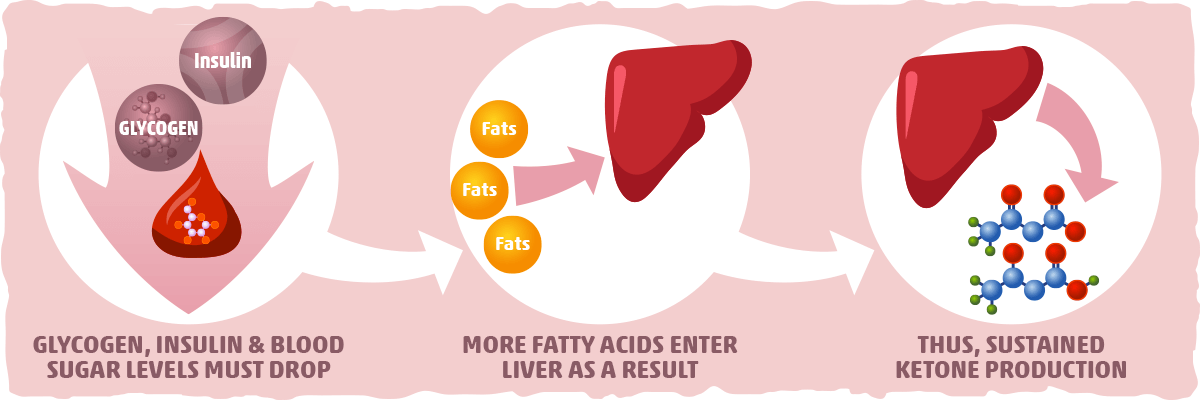
Your body must go through a series of steps before you can enter ketosis. Glycogen (our storage form of sugar), insulin, and blood sugar levels all must drop, which allows fatty acids (from your fat cells and your diet) to enter your liver in larger quantities and at a faster rate. This combination of changes sets the stage for sustained ketone production by consistently stimulating ketogenesis.
If these physiological processes do not occur, then your body will struggle to produce enough ketones to sustain ketosis on its own. Without giving your body the time it needs to adapt to ketone burning, you will not experience all of the benefits of ketosis.
By supplementing with exogenous ketones, you are essentially forcing your body into ketosis without establishing the foundation for sustaining ketone production. The result (If you are consuming a high-quality ketone supplement) is a quick increase in ketone levels that will drop after your body burns them and/or excretes them unused.
This means that the benefits of taking ketone supplements can only go as far as your body is adapted to using ketones for fuel and as long as it takes for the ingested ketones to be used or excreted.
In other words, if your body is already a fat-burning, ketone-using machine (after following the keto diet for at least a month), it will probably be able to extract the most out of each exogenous ketone servings.
In contrast, if you are looking for a short cut to weight loss and ketosis without setting the foundation for sustaining ketone production and losing fat with a keto diet, then exogenous ketones will not do much for you at all.
In both cases, any benefits you do experience will only last for a few hours. The overwhelming majority of your health and weight loss results will be a direct result of the food you eat on a daily basis, not the ketone supplement you take.
Ketone and Blood Sugar Regulation
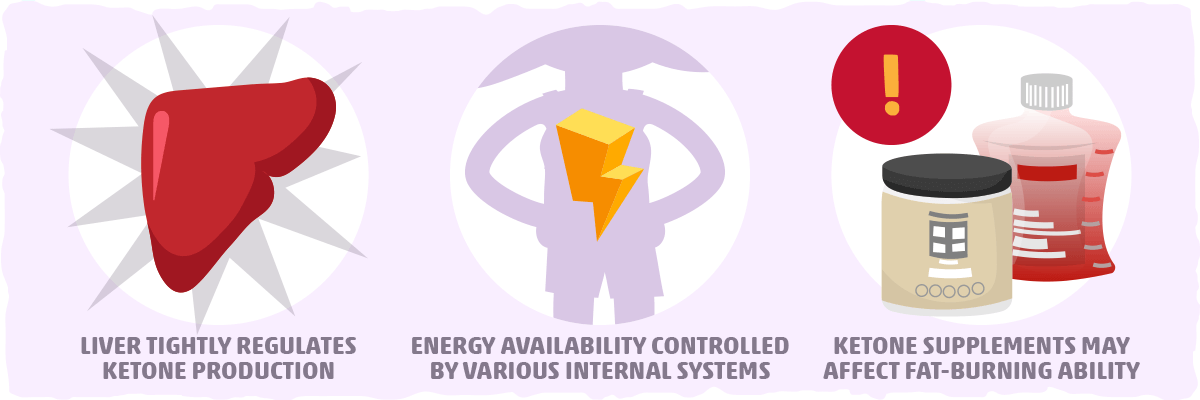
Although ketones and sugar provide us with the energy we need to stay alive, they can also be life-threatening if their levels get too high in our bloodstream. Fortunately, our bodies have many regulatory feedback loops to help prevent blood sugar levels and/or ketone levels from getting out of control.
As an example, when we enter nutritional ketosis after following a keto diet, our liver tightly regulates ketone production and will not overproduce this alternative energy source. This is because energy availability is closely controlled throughout our bodies with the help of various hormones, substrates, and other signaling molecules. For the most part, we only produce what our bodies can handle and will rarely stray far above that.
(Side note: The only exception to this rule of ketone level regulation is when someone has type 1 diabetes or type 2 diabetes that is not under medical supervision, and both blood sugar and ketone levels start rising uncontrollably. This condition is known as ketoacidosis and is relatively rare for most people, especially if you are following a keto diet. If you’d like to learn more about this condition, check out our guide to ketoacidosis.)
In contrast to endogenous ketone production, exogenous ketone consumption will stimulate these regulatory mechanisms to a much greater extent to keep the sudden influx of ketones under control.
More specifically, studies have found the administration of ketones to decrease the release of fatty acids from fat cells and increase the effects of insulin (whether this is from increased insulin secretion and/or through enhancing insulin’s activity is not clear yet).
Put in another way, exogenous ketone supplements, which are said to help you “ignite” fat loss, actually extinguish your fat-burning fire until you use up enough of the supplemental ketones and your energy needs increase again.
It is worth noting, however, that these same mechanisms might be helpful for improving insulin function and increasing the effectiveness of keto diets for insulin resistant patients. Research is still needed to explore the potential therapeutic effect that exogenous ketones might have for people with type 2 diabetes.
Key Takeaways: Exogenous Ketone Supplementation Vs. Nutritional Ketosis
Although ketones play a substantial role in the benefits of keto dieting, this doesn’t mean that taking exogenous ketones will provide us with a shortcut to these exact results.
In fact, the opposite may be true. Here’s why:
- Entering and maintaining ketosis requires many beneficial biological changes to take place. These changes do not occur when we rely on ketone supplements instead of a keto diet to increase our ketone levels.
- Without being keto-adapted to some degree, the likelihood that exogenous ketones will not be used to their fullest potential increases.
- Exogenous ketone supplementation temporarily shuts down fat burning and increases insulin activity. Both of these biological processes keep you from burning your own fat until your energy needs increase again.
Next time you see advertisements for exogenous ketone supplements, such as ketone salts and ketone esters, make sure you refresh your memory of keto diet ketosis. By doing so, you will be able to see through many of the false claims, allowing you to assess the value of common keto supplements more accurately.
Exogenous Ketone Myth Busting: The Misleading Marketing of Ketone Salts and Ketone Esters
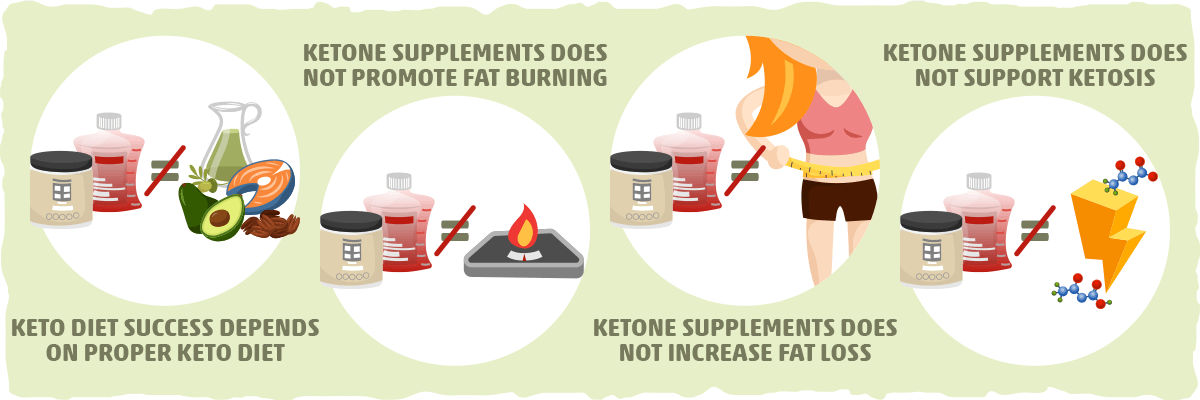
Let’s take a look at some of the most common exogenous ketone claims to illustrate what I mean:
Myth #1: You’ll experience the benefits of keto dieting with exogenous ketones.
The path to ketosis, the process of ketone production, and carb restriction all play vital roles in keto diet success. Merely taking a supplement that forces you into ketosis can only give you a small taste of the benefits of keto dieting.
Myth #2: Exogenous ketones ignite fat burning. You should take these supplements because being in ketosis supports faster fat burning.
In reality, exogenous ketone supplementation does the exact opposite. The ketones you consume will decrease the release of fatty acids from your fat cells and reduce endogenous ketone production.
Being in ketosis as a result of following a keto diet does support faster fat burning, but being in ketosis after consuming exogenous ketones does not.
Myth #3: Exogenous ketones increase fat loss.
There is no evidence to support this claim, and given what we learned earlier, ketone supplementation will only slow fat loss.
We will discover later, however, that exogenous ketones can reduce hunger levels, but there is no research examining if this translates to decreased food consumption and increased fat loss.
Myth #4: Exogenous ketones support ketosis.
Although these supplements can send you into ketosis more quickly than keto, they don’t support your ability to stay in ketosis. In reality, they shut down ketone production until you burn through the consumed ketones. Once you’ve processed your dose, your ketone levels will be dictated by your diet, not by the fact that you took a ketone supplement earlier in the day.
These four myths represent the most common misleading claims made by exogenous ketone supplement producers. With a simple grasp of the difference between keto diet ketosis and ketosis induced by exogenous ketones, it is much easier to decipher the truth behind the ketone supplement sales pitches.
That being said, this doesn’t mean that all ketone supplements are completely worthless. When used in the right context for the right person, they can be helpful.
An Overview of the Exogenous Ketone Literature: The Potential Benefits
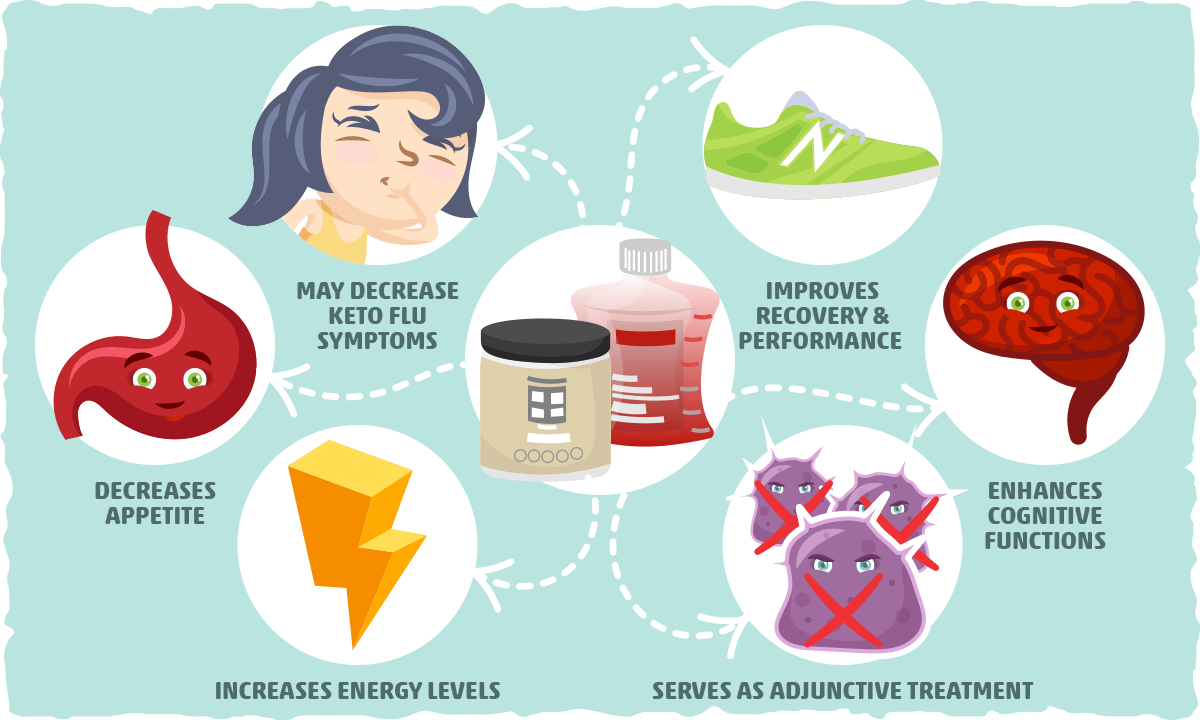
As we discussed earlier, to experience the benefits of ketosis to the fullest, many physiological changes must be in place. This is partly why the research on ketone salts and ketone esters is riddled with contradicting data. However, there is still some promise for ketone consumption.
Given the current evidence, here are the potential benefits of exogenous ketone supplements with all of the marketing claims and hyperbole taken out:
-
May decrease keto flu symptoms, making keto induction easier
By providing your body with ketones during your first few days of keto dieting, you may be able to prevent the mental and physical fatigue associated with keto induction.
Ketone salts that contain sodium, potassium, and magnesium may be the better supplement option in this scenario because this ketone supplement will provide your body with an alternative energy source and extra minerals that will help you adapt to carb restriction.
-
Decreases appetite
Recent research indicates that ketone ester supplementation lowers ghrelin levels (our primary hunger hormone), perceived hunger, and desire to eat for up to four hours. It is unclear if these effects translate to a significant decrease in calorie intake that leads to increased fat loss.
Anecdotal reports from many keto dieters, however, indicate that sustaining higher ketone levels help them keep their appetite under control and lose more weight.
-
Increases energy levels
If you consume exogenous ketones, your body will process them immediately after digestion. This can translate to a stable energy boost for a few hours.
Keto-adapted individuals are likely to experience an even greater energy increase because their bodies will be prepared to handle an increase in ketones without them going to waste.
-
May improve endurance exercise performance and recovery
Ketones are a more efficient energy source than sugar, mainly when they are used for endurance activities such as running and cycling.
The research on exogenous ketones supplementation for exercise performance, however, indicates that they can have either a negative effect, a net benefit, or no significant effect. It is also unclear how much of a difference being keto-adapted makes when using exogenous ketones to boost results.
At this point, the research indicates that taking a BHB ketone ester with carbohydrate prior to exercise provides most significant, yet still incremental, increase in performance compared to other exogenous ketone supplement dosing strategies. One study also found that exogenous ketones may help athletes recover their glycogen stores post-exercise.
-
Enhances cognitive function
Case reports, a small trial in athletes, and animal studies indicate that including exogenous BHB in the diet can improve cognitive performance. Research on keto diets and medium chain triglycerides (an endogenous ketone-boosting supplement) also found that ketosis has a beneficial impact on cognitive function and mental clarity.
One potential mechanism behind these results is that BHB has been found to stimulate the expression of brain-derived neurotrophic factor (BDNF), a growth factor that some researchers refer to as “Miracle-Gro for the brain.”
-
May serve as an adjunctive treatment for certain neurological disorders, type 2 diabetes, and some types of cancers
Research on the keto diet, medium chain triglycerides, and exogenous ketone supplements all indicate that ketosis can be helpful for patients with certain cancers, Alzheimer’s disease, Parkinson’s disease, type 2 diabetes, and epilepsy. Exogenous ketones, specifically, can help these patients experience some of the benefits of ketosis if they cannot stay on a strict keto diet for any reason.
As you can see, ketone supplements aren’t the miracle weight loss supplement they are said to be, but they can provide your current dietary approach with an edge when used for the right reasons. Before you start experimenting with ketone esters or ketone salts, however, it is important to learn about their potential downsides and explore other ketone supplement alternatives as well.
Exogenous Ketone Supplements: The Downsides
Before we close out our comprehensive look at ketone salts and esters, let’s explore the potential downsides:
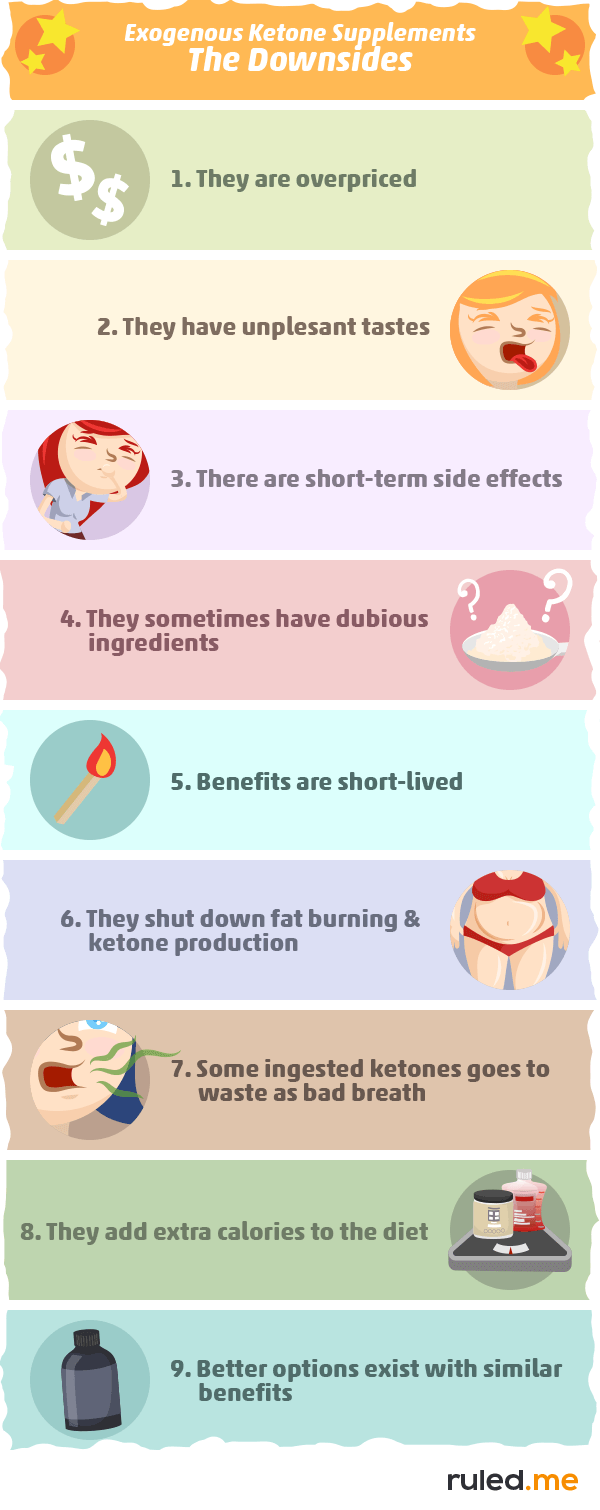
-
Overpriced
Ketone salts and esters are both ridiculously expensive when you consider the paucity of research on them and how quickly your body will burn through each serving.
Ketone salts are your cheapest option, but they will still break most budgets at around $60 for just 16 servings. This pales in comparison, however, to the cost of ketone esters, which have you paying 4x more per gram of ketones.
Fortunately, there is a much cheaper ketone-boosting supplement that has more research to back its benefits: MCT oil. We will learn more about MCTs later in this article.
-
Unpleasant taste
Most ketone salts are difficult to drink because they taste so bad, but there are many flavored ketone supplements that hide the taste pretty well.
Ketone esters, on the other hand, are difficult to get down and it’s even more difficult to disguise their horrid taste.
-
Short-term side effects
The consumption of exogenous ketone supplements can provoke some keto flu symptoms like fatigue, headaches, dizziness, cramping, diarrhea, constipation, and heart palpitations. (For more information on keto flu symptoms and how to remedy them, click here.)
These symptoms are related to the diuretic effect that ketones have on the body, so make sure you are staying hydrated if you supplement them exogenously or are following a keto diet.
There have also been reports of vomiting, nausea, and abdominal pain after the ingestion of ketone esters and increased acetone secretion (like nail polish remover being excreted with your breath and sweat) after ketone salt ingestion.
-
Dubious ingredients
Many ketone supplements may contain a mixture of D- and L- BHB and/or some acetoacetate (another type of ketone) while the most effective ketone body to supplement with is D-BHB.
You may also find sweeteners and hidden net carbs that can make it much harder for you to reach deeper levels of ketosis after you burn through your supplemental ketones.
-
Short-lived benefits
As we described earlier, the benefits of exogenous ketones only last for as long as it takes for your body to use them.
Studies indicate that it may take around 3-6 hours for ketone levels to drop to baseline after ketone ingestion. How long it lasts depends on many factors including your diet, activity levels, and ability to burn ketones.
-
Shuts down fat burning and ketone production
Although these supplements can send you directly to ketosis, they do not promote fat burning and ketone production. Marketing claims that tell you otherwise are conflating the benefits of the keto diet with ketone supplements.
The truth is that your body will preferentially burn off the ketones you ingest before it burns your body fat and ketones as its predominant fuel source.
-
Some ingested ketones may go to waste
If the proper metabolic machinery isn’t in place to handle an increased ketone load, the ketones you ingest may end up being converted into acetone without providing you with any benefits.
You will know this is happening in your body if your breath and/or body odor starts smelling like overripe fruit or nail polish remover.
-
Adds extra calories to the diet
Although you technically can’t store ketones as fat, they are still a source of calories that we should be aware of.
If you are supplementing with ketones regularly, then these calories will begin to accumulate, increasing the likelihood that the calories you consume from fat, carbs, or protein will be converted into body fat.
-
Better options exist with similar benefits
We’ve focused primarily on exogenous ketone supplements, but there are other supplements that boost ketone production as well. They are much cheaper, increase ketone levels reliably, and have minimal side effects.
We will take a look at these supplements after we finish our examination of exogenous ketones.
Putting It All Together — The Pros and Cons of Exogenous Ketone Supplements
Let’s sum up what we’ve learned so far by going over the pros and cons of ketone salts and esters:
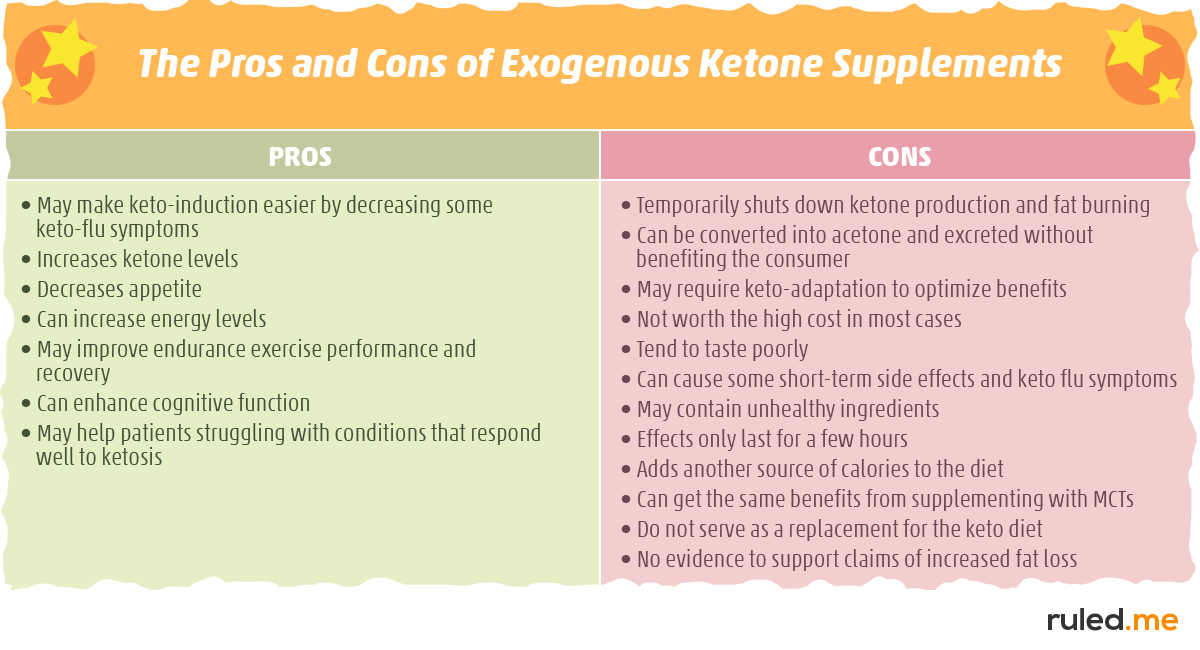
Are Ketone Salts or Ketone Esters Worth It for You?
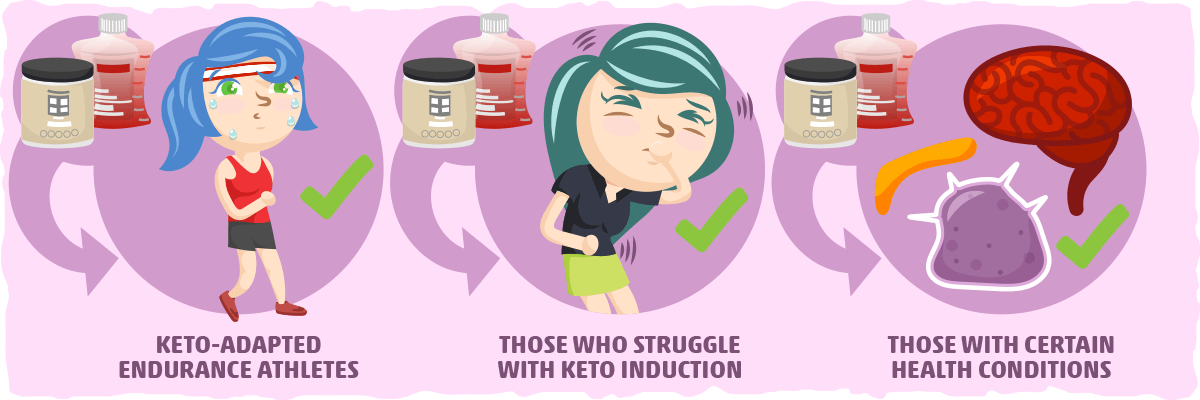
When considering the pros and cons of exogenous ketone supplements, it is difficult to make a case for them being worth the investment. Their cost and transient effects are enough to discourage most people from trying them out.
If you are looking to lose weight and improve health, you will get much better results from investing your supplement money in high-quality keto foods and making healthy lifestyle changes instead.
That being said, some people may find these supplements to be worth a try.
Who Would Benefit Most from Exogenous Ketone Supplementation?
Based on the current research, people who fit into these groups may find exogenous ketone supplements to be helpful:
- Keto-adapted endurance athletes. It seems that being adapted to the keto diet and taking ketone esters along with some carbs may be the most effective way to take endurance performance to the next level.
- People who are struggling with keto induction. If keto flu is hitting you hard and nothing else seems to help, supplementing with ketone salts may help provide you with the energy you need to overcome fatigue and nudge your cells into becoming more keto-adapted.
- People who have health conditions that benefit from ketosis, but cannot stay on the keto diet for any reason. Ketone salts and esters might be helpful in the treatment of type 2 diabetes, some neurological disorders, and certain types of cancer if the keto diet is not a suitable option.
However, If you find that ketone salts or ketone esters are worth the cost for you, don’t buy them just yet. These aren’t the only ketone boosting supplements that can help with keto induction, exercise performance, and specific health conditions.
MCT Oil: The Endogenous Ketone Booster
Earlier in this article, we explored the differences between naturally stimulating ketosis with a keto diet and forcing the body into ketosis with an exogenous ketone supplement. So many physiological processes are behind becoming a ketone- and fat-burning machine that we miss out on many keto diet benefits by skipping them altogether.
Fortunately, there is a ketone-boosting supplement that actually supports ketosis and ignites fat burning. This is supplement is known as MCT oil.
MCT stands for medium chain triglycerides — a type of saturated fat that skips the normal digestive process of other fats. Instead of being digested and transported through the lymph like other long-chain fats, MCTs are absorbed quickly through the small intestine and go straight to the liver.
This influx of MCTs into the liver mimics the process that occurs when fatty acids are released from our fat cells and enter the liver during carb restriction. As a result, the ketogenesis is stimulated, and the abundance of fatty acids are converted into ketones.
By supplementing with MCTs rather than exogenous ketones, you are giving the liver the substrates it needs to jump start ketosis without shutting down ketone production. The difference is subtle in concept but represents a more supportive ketone-boosting strategy physiologically.
The research on MCT supplementation is more extensive and convincing than what we’ve found to support exogenous ketones as well. Here is a brief summary of the science-backed benefits of MCTs:

- Weight loss boosting properties
- Can decrease keto flu symptoms, making keto induction easier
- Appetite reduction
- Improved exercise performance and endurance
- Increased energy levels
- Reduced cardiovascular disease risk in some people
- Enhanced brain health and cognitive function
- Acts as a potential treatment for medical conditions that respond well to ketosis
- May improve insulin sensitivity and blood sugar levels
- Helps boost immune system function and regulation
- Gut health regulation
- Improved absorption of certain nutrients
- Enhanced liver cell function
- May increase longevity and reduce the mortality risk from heart disease
You can find a breakdown of the research behind these benefits and other information on MCTs by clicking here >
Overall, the research indicates that MCTs are equally, if not more, beneficial than exogenous ketone supplements. They also have positive effects that extend beyond what a ketone ester or salt is able to do.
However, as with ketone salts and esters, digestive issues can occur when supplementing with too many MCTs. For this reason, it is best to start with a small amount (1-1.5 teaspoons) and increase day by day until you work up to a 1-4 tablespoon dose. You can also use MCT oil powder, which tends to be more tolerable at higher doses.
To maximize your keto diet, we recommend using MCT oil or MCT powder as your personal ketone and energy level booster. It will be especially useful during your first few days of keto dieting when your body is trying to adapt to carb restriction.
MCT Oil vs. Exogenous Ketones: Which One is the Better Ketone-boosting Supplement?
Both supplements can help boost ketone levels and provide us with similar benefits, but this is where they begin to diverge. To help us decipher which one may be a better option for you, we must take a look at their primary differences:
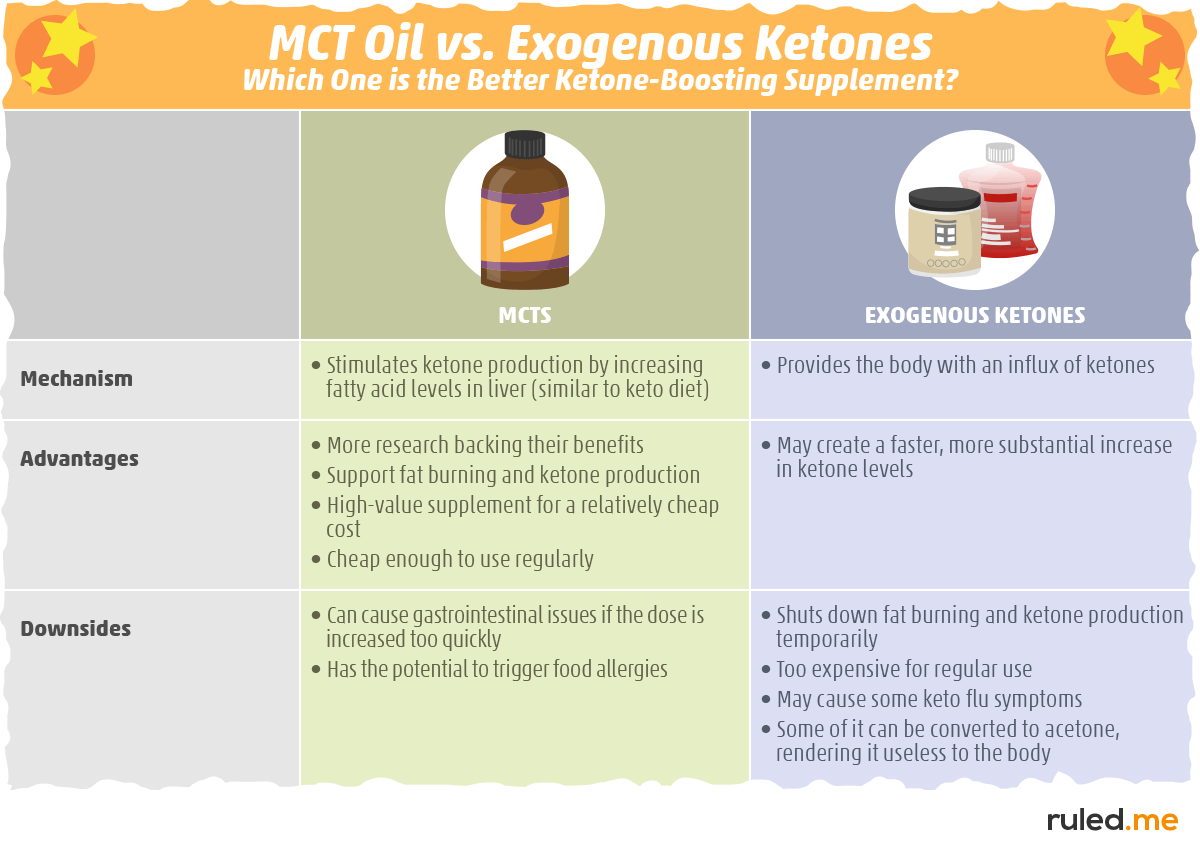 The research on exogenous ketones is not promising enough to justify their high price, especially since you can get similar benefits (and potentially more benefits) from MCT supplements.By charting these two ketone-boosting supplements together, we can see that MCTs are likely to be the better option for most people.
The research on exogenous ketones is not promising enough to justify their high price, especially since you can get similar benefits (and potentially more benefits) from MCT supplements.By charting these two ketone-boosting supplements together, we can see that MCTs are likely to be the better option for most people.
What is the Best Ketone Supplement? With Recommendations from Keto Researcher, Dr. Dom D’Agostino

You may have already guessed that we’d select MCT oil has the ideal ketone supplement. However, we have yet to address what happens when we combine exogenous ketones and MCTs together.
Well-known nutritional ketosis and ketone supplementation researcher, Dr. Dominic D’Agostino, speculates that the best ketone supplement may be one that combines exogenous ketones with MCTs.
Here is a direct quote about ketone supplementation from Dr. D’Agostino’s blog:
Ideally the ketone supplement (ketone salt) should be mixed with ketogenic fats, like medium chain triglycerides (MCT oil), which also stimulates endogenous ketogenesis.
This makes sense in theory, but does it justify the high price tag that these combo ketone supplements come with?
Since there is even less research on MCTs + exogenous ketones than there is on exogenous ketones, it is difficult to tell if these supplements are indeed the best option.
When we consider this with the current literature and our bank accounts, MCT oil supplements still seem to be the best ketone supplement available. They provide us with the most scientifically-proven bang for the buck.
If you are looking to try it out for yourself, I recommend reading through our comprehensive guide to MCT oil first. If MCT sounds right for you, check our the brands we recommend on our Keto Supplement Recommendations page.
Side Note: What About Raspberry Ketone Supplements?
Although they have “ketone” in their name, raspberry ketones do not boost ketone levels. “raspberry ketone” is simply the name for the compound that gives raspberries their potent aroma and flavor.
Some research indicates that they can help with fat loss in animals at high doses, but there is no evidence to suggest that raspberry ketone supplements can confer the same benefits for humans.
As we learned with the exogenous ketone research, the only way to lose substantial amounts of fat and keep it off is by making healthy lifestyle and dietary changes. No weight loss supplement can compete with the effect of a well-formulated weight loss diet.
Key Takeaways: Everything You Need to Know About Ketone Supplements
Exogenous ketone supplements can be helpful, but not in the way you may think.
Ketone salt powders, keto pills, and ketone esters — the three exogenous ketone products on the market right now — do not ignite fat loss or ketone production. There is also no data to support the claim that they can help us lose weight or burn fat.
At best, these supplements may help boost endurance exercise performance, aid in the treatment of specific health conditions, increase energy levels, and relieve certain keto-flu symptoms. However, the research for these particular benefits still lacks sufficient data.
One thing we know for sure is that these supplements do not act as a replacement for following a ketogenic low carb diet.
Being in ketosis as a result of keto dieting will improve blood glucose levels and stimulate the release of fatty acids for fat cells, whereas being in ketosis after taking a ketone ester or salt will decrease fat burning and ketone production.
The secret to achieving your goal weight and experiencing the unique benefits of ketosis is found within the keto diet, not the exogenous ketone canister.
That said, If you are looking for a way to boost your ketone levels in the short term, here are the simplest, budget-friendly strategies you can try:
- Supplement with MCT Oil. This will provide your body with ketogenic fatty acids that can be converted directly to ketones in the liver.
- Drink a caffeinated beverage in the morning (caffeine boosts ketone production).
- Try intermittent fasting.
- Implement the fat fasting technique.
- Add exercise to your daily routine (fasted training can help boost ketone levels even more).
- Start your morning off by combining a zero-carb caffeinated beverage, MCT oil, and fasted exercise.
And, if you do end up deciding that exogenous ketones are worth the cost to you, here’s a great brand we recommend.
Sources
- Prior ingestion of exogenous ketone monoester attenuates the glycaemic response to an oral glucose tolerance test in healthy young individuals — The Journal of Physiology
- A Ketone Ester Drink Lowers Human Ghrelin and Appetite. — NCBI
- Ketone Supplements: The Pros and Cons — Virta Health
- The Population Pharmacokinetics of d-β-hydroxybutyrate Following Administration of (R)-3-Hydroxybutyl (R)-3-Hydroxybutyrate — NCBI
- The use of nutritional supplements to induce ketosis and reduce symptoms associated with keto-induction: a narrative review — NCBI
- On the Metabolism of Exogenous Ketones in Humans — NCBI
- Ketone Bodies and Exercise Performance: The Next Magic Bullet or Merely Hype? — NCBI
- Metabolism of ketone bodies during exercise and training: physiological basis for exogenous supplementation — The Journal of Physiology
- Ketone Diester Ingestion Impairs Time-Trial Performance in Professional Cyclists — Frontiers in Physiology
- A Ketone Ester Drink Increases Postexercise Muscle Glycogen Synthesis in Humans. — NCBI
- Nutritional Ketosis Alters Fuel Preference and Thereby Endurance Performance in Athletes — Cell Metabolism
- Novel ketone diet enhances physical and cognitive performance — NCBI
- Clinical review: Ketones and brain injury — NCBI
- Potential Synergies of β-Hydroxybutyrate and Butyrate on the Modulation of Metabolism, Inflammation, Cognition, and General Health. — NCBI
- Intermittent Running and Cognitive Performance after Ketone Ester Ingestion. — NCBI
- MCT Oil: The Benefits, Risks, and How to Use — Ruled.me
- Keto OS Side Effects and Benefits: Is It Worth It? — Ruled.me
- Using Ketone Supplements for Weight Loss — Dominic D’Agostino
- Do Raspberry Ketones Really Work? A Detailed Review — Healthline
- Caffeine intake increases plasma ketones: an acute metabolic study in humans. — NCBI
- Oxaloacetate deficiency in MCT-induced ketogenesis. — NCBI
- Ketone beta-hydroxybutyrate up-regulates BDNF expression through NF-κB as an adaptive response against ROS, which may improve neuronal bioenergetics and enhance neuroprotection (P3.090) — Neurology
- Tolerability and Safety of a Novel Ketogenic Ester, Bis-Hexanoyl (R)-1,3-Butanediol: A Randomized Controlled Trial in Healthy Adults — NCBI
- Do Exogenous Ketone Supplements Work for Weight Loss? — Healthline
